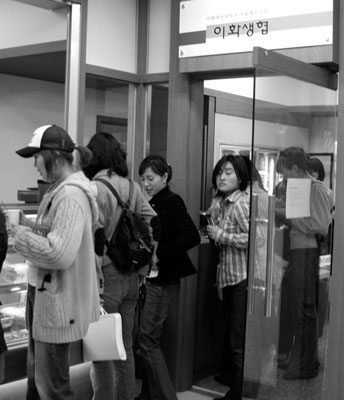
Ever since the beginning of the fall semester, there have been noticeable changes in and around Ewha Campus; the construction not being the only conspicuous change. All the canteens on campus, except for those in the Ewha-POSCO Hall and the International Education Building, are now fully run by Ewha Cooperation, or "Ewha Saeng Hyeop."
Before this semester, many canteens in Ewha were managed by an outside corporation that ran them for profit. However, with the expiration of these cooporations' contracts, Ewha Cooperation was asked by the school to manage most of the canteens due to its beneficial policy of returning the profits to students through scholarships and other programs. Thanks to this change, students can now buy snacks and meals at low prices (a ten percent discount from the original price) almost everywhere on campus.
Ewha Cooperation is a non-profit organization whose goal is to promote a healthy consumer lifestyle to students at Ewha. As its name suggests, Ewha's faculty members, students, and staff put their heads together and "cooperated" to use the profits from the canteen sales for the benefit of students' benefit. Ewha Cooperation was introduced in Ewha in 1989 after faculty members and school staff got the idea that it would be good to have a canteen that cared more about students' and their well-being than about profits.
Cheap price is not the only benefit students enjoy from Ewha Cooperation. Most of the organization's benefits are reserved for its members. Members' benefits include getting five percent of purchases back in the form of "mileage" points by using a student ID card, which can be used instead of cash, and buying Ewha Cooperation's printer cards at a ten percent discount. Also, members don't have to pay ten percent commission like non-members when selling books at the flea market which is held at the beginning of every semester. Also, they can participate in programs like going on field trips to historical sites or visiting food corporations to see how food is processed free of charge.
Professors, students, and staff can join Ewha Cooperation by investing money (from a minimum of 10,000 won to a maximum of 100,000 won) in Ewha Cooperation at its office located inside the Ewha Cooperation canteen on the B1 floor of the Student Union Building. This investment will be returned to the investor after a year with an interest rate of 15 percent added, or the investor can get the money back whenever she withdraws from Ewha Cooperation. Members should attend Ewha Cooperation seminars three times a semester, but attendance is not mandatory.
The management work of Ewha Cooperation's programs for students is mainly done by the Ewha Cooperation student council. Composed of eight students, the Ewha Cooperation student council organizes how the Ewha Cooperation budget should be used for Ewha students, lets Ewha students know about Ewha Cooperation, and also keeps an eye on the group's food delivering contractors by visiting their production facilities and checking that the Kimbab and sandwiches Ewha students eat are processed hygenically. But that's not all that they do. They are also like any other club at Ewha and get together to meet good friends, dine together and go on retreats.
Fulfilling as it may be to be one of the members of the Ewha Cooperation student council, there are also tough times. Kim Ji-hyun (Korean Lang. & Lit., 2), a member of the Ewha Cooperation student council, mentioned how hard it was to organize the flea market for books, starting with book collection, and then keeping records, rushing out after class to sell them, and sometimes being heartbroken to find that some books had been stolen. She says, "The commission earned from selling the books has to be used to make up for that loss. Thus, less money goes into the hands of those in need, where it is supposed to be going to."
Still, Kim says, "I'm interested in welfare activities and it sure feels good when I see happy smiles on students' faces when they buy something at a cheaper price. For Arbor Day, we buy plants wholesale beforehand and then sell them at a lower price, and students really like that."
Ewha Cooperation currently has 2,000 members. Kim believes that the number will soon grow with the new mileage point system launched in the middle of October, by which students can benefit from simply by presenting student ID cards to the cashiers.

